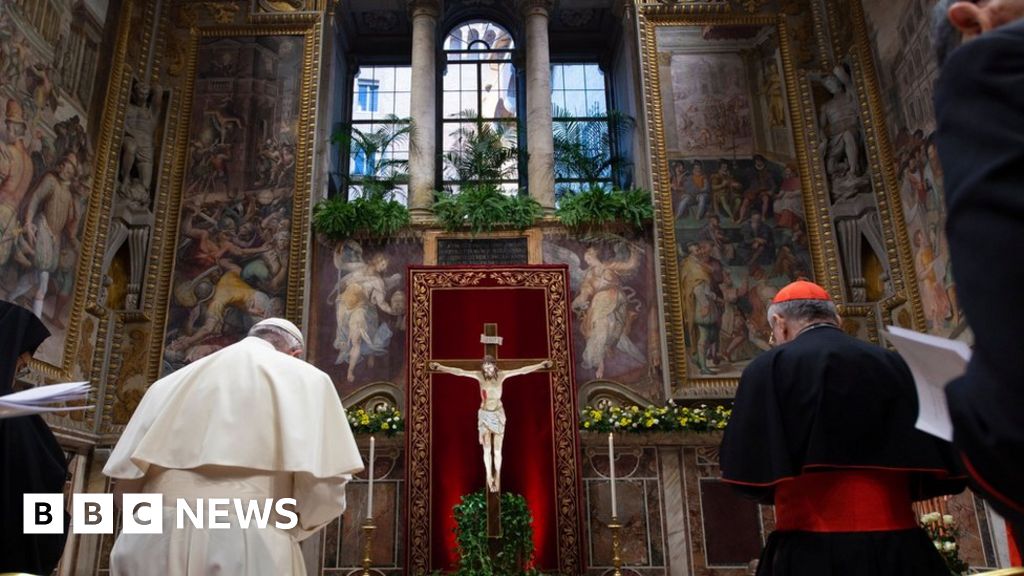Religion (Part C)
by
Charles Lamson
Religion and Social Change
The role of religion in bringing about social change is an important aspect of life in those societies. Indeed, in many parts of the world, religion is one of the primary forces opposing or supporting change. However, it is not always a simple matter to predict whether religion will encourage change or hinder it.
 |
In the United States, the Catholic church plays an active role in seeking social change. The church strongly opposes abortion. Instead, it supports a return to the traditional view of abortion as a crime, which is based on the belief that humans must submit to the will of God and not use their technological skills to achieve power over life and death. In this instance, therefore, although the church is promoting social change, the change represents a return to an earlier standard. Throughout much of Latin America, in contrast, the Catholic church is fighting in support of the masses of urban and rural poor who seek social justice and equitable economic development. In Brazil, for example, the typical Catholic priest or nun favors the political left, which seeks a more egalitarian distribution of wealth and income and is highly critical of the rich (Kornblum, 2003, Sociology in a Changing World, 6th Ed., p. 527). We could add many other examples of the role played by a religion and religious organizations in social change. But in attempting to generalize about the relationship between religions and social change it is useful to return briefly to classic sociological theories. The pioneering European sociologists, particularly Karl Marx and Max Weber, noted he prominent role of religion and social change. But they wondered whether the influence of religious faith is a determining force in social change or whether religious sentiments and the activities of religious organizations are an outgrowth of changes in more basic economic and political institutions. Marx believed that economic institutions are fundamental to all societies and that they are the source of social change. In his view, religion and other institutions are shaped by economic and political institutions; they are a "superstructure" that simply reflects the values of those institutions of markets, firms, the government, the military, and so on. The function of cultural institutions, especially religion, is to instill in the masses the values of the dominant class. In this sense they can be said to shape the consciousness of a people, but they do so in such a way as to justify existing patterns of economic exploitation and the existing class structure. Religion, in Marx's words, is the "opium of the people" because it eases suffering through prayer and ritual and deludes the masses into accepting their situation as divinely ordained rather than organizing to change the social system.
For Weber, on the other hand, religion can be the cause of major social change rather than the outcome or reflection of changes in other institutions. Weber set forth his thesis in one of his most famous works, The Protestant Ethic and the Spirit of Capitalism (1974/1904). Noting that the rise of Protestantism in Europe had coincided with the emergence of capitalism, Weber hypothesized that the Protestant Reformation had brought about a significant change in cultural values and that this was responsible for the more successful development of capitalist economic systems in Protestant regions. As Weber explained it, Protestantism instilled in its followers certain values that were conducive to business enterprise, resulting in the accumulation of wealth. Because the early Protestants believed that wealth was not supposed to be spent on luxuries or the pleasures of the flesh, the only alternative was to invest in new or existing business enterprises---in other words, to contribute to the rapid economic growth characteristic of capitalist systems (Kurtz, 1995, Gods in the Global Village). This view was reinforced by the belief---also part of the Protestant ethic---that a person who worked hard was likely to be among those predestined for salvation. Some have questioned the validity of Weber's thesis regarding Protestantism and early capitalism, but there can be no doubt that religious institutions are capable of assuming a major role in shaping modern societies. Throughout the Islamic world there are currents of orthodoxy and reform that threaten to cause both civil and international wars. And as noted earlier, in many Latin American communities the Catholic Church leads the movement for large-scale social change. So Marx was wrong in his claim that religion functions largely to maintain the existing values of more basic social institutions. On the contrary, religion can often lead to new ways of organizing societies---to new political and economic institutions as well as whole new lifestyles. The Marxian view of religion is still relevant to those who are critical of the influence of religious institutions. These critics assert that religion, along with other cultural institutions such as education, reaffirms and perpetuates inequalities of wealth, prestige, and power. When the poor are encouraged to pray for a better life, for example, they are further oppressed by a religion that prevents them from realizing that they need to marshal their own power to challenge the status quo. Thus there is still some question about whether (and how much) religious institutions change society in any fundamental way.  To make informed judgments about this and related issues, we need to have a better understanding of the nature of religious organizations and how they function in modern societies. In the next couple of posts, therefore, we describe the main types of religious organizations. We then focus on trends in religious belief and practice in the United States. *MAIN SOURCE: KORNBLUM, W., 2003, SOCIOLOGY IN A CHANGING WORLD, 6TH ED., PP. 526-527* end |


No comments:
Post a Comment